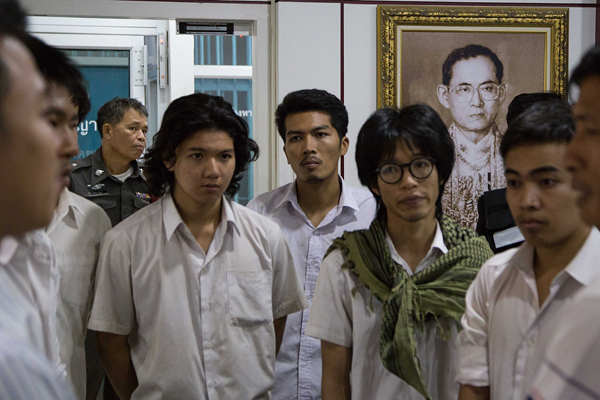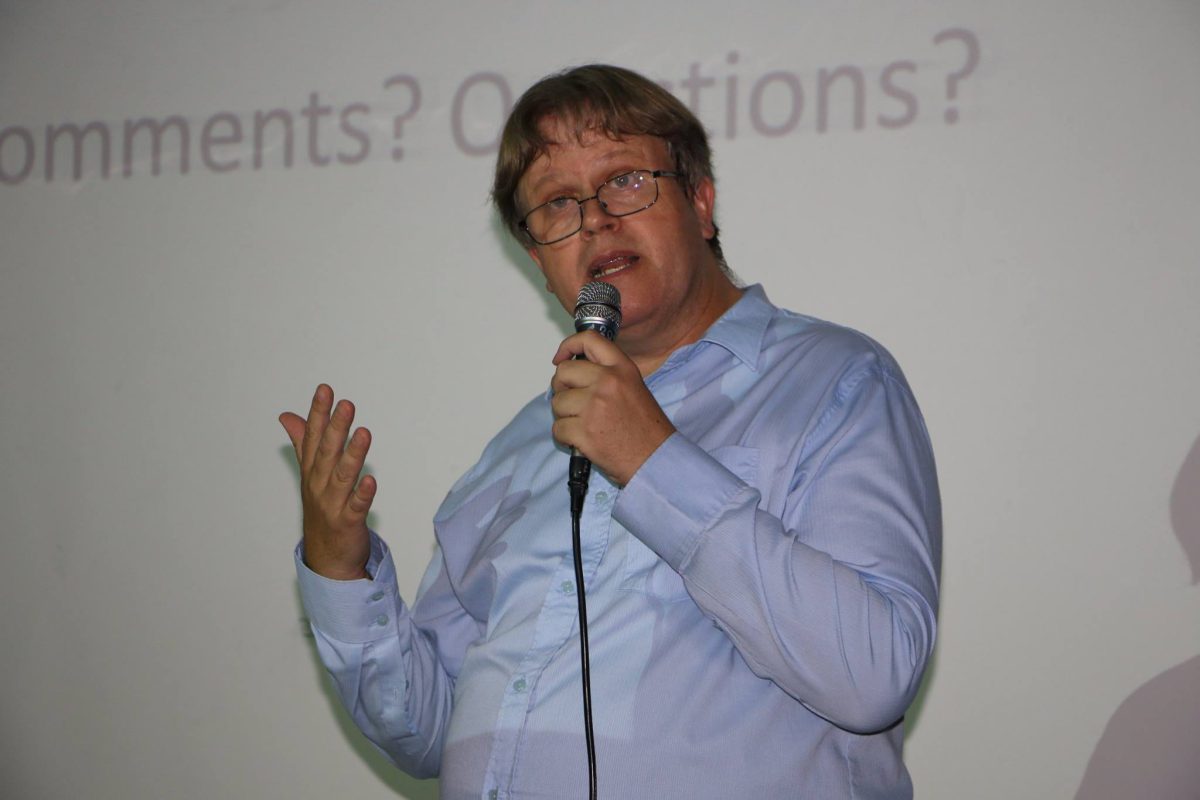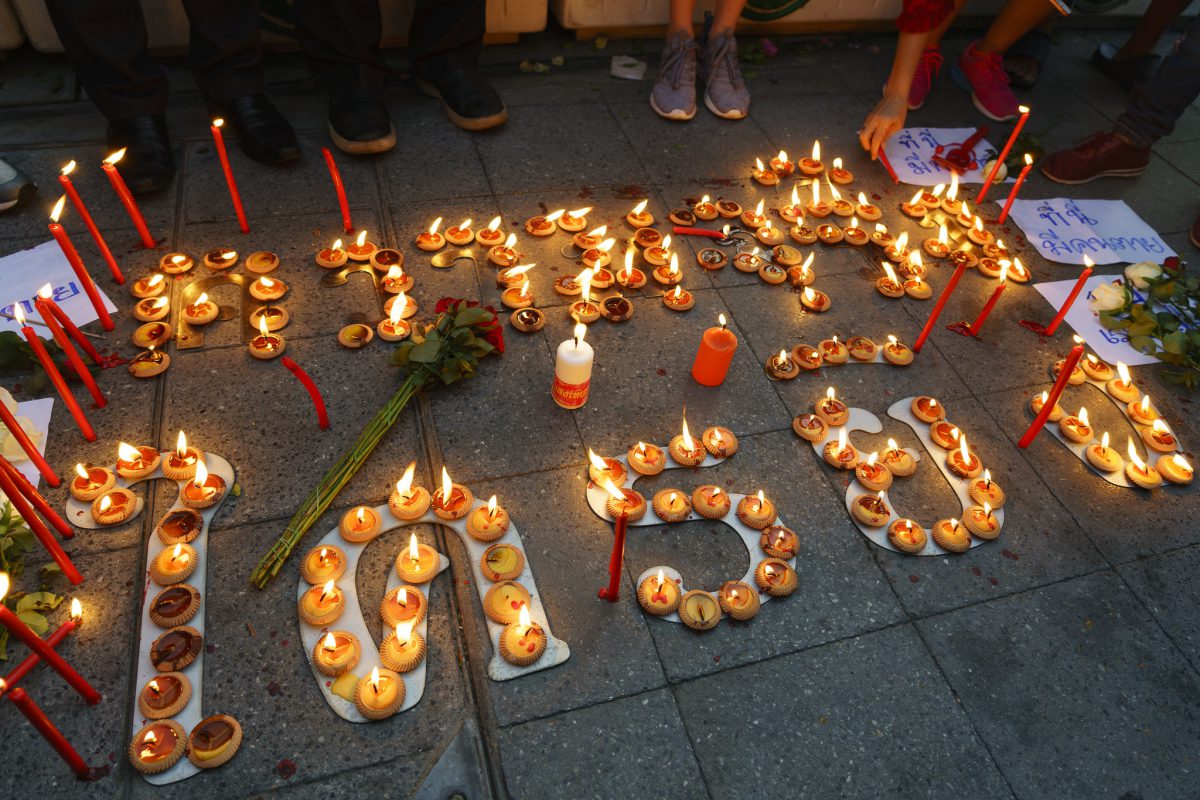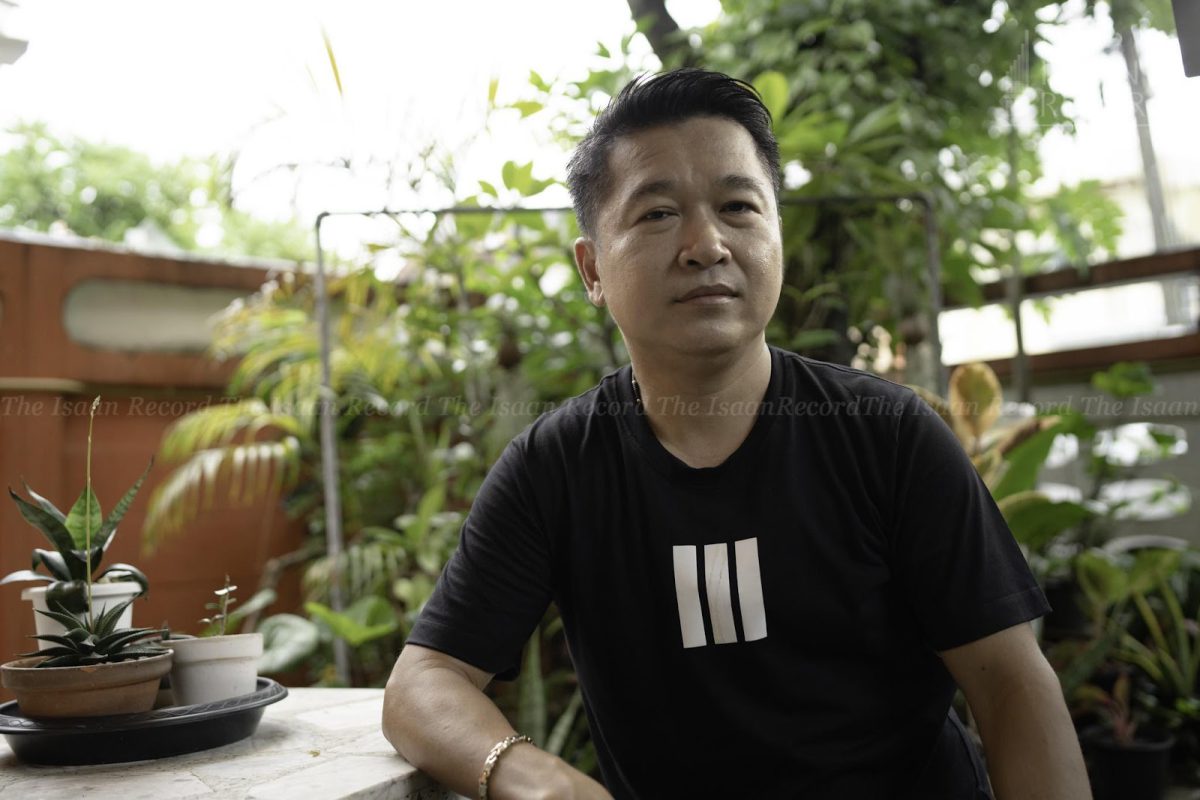KHON KAEN – The Law and Human Rights for Society Group, better known as “Dao Din,” is a student activist group that recently has been widely praised and criticized for involvement in anti-junta student protests. Critics have raised questions about the reasons behind the group’s symbolic activities against the coup, the group’s alleged backers, and even about the low grades of members in the university.
The Isaan Record talks to two Dao Din members, Suwicha Pitangkorn and Supachai Phuklongploy, about the recently voiced criticisms.
IR: After Dao Din’s protests against the coup, many critics have wondered publicly about “who is behind or in controls the group.” There have been allegations that the group is backed by politicians or a political party, by communist groups, or even by an international organization. How would you respond to this?
Suwicha: Oh, this is easy to answer. I barely know anything about any politicians, who they are, or what they do. So why would they support us? Why would they hire us? Mostly, what we do is go to rural communities. Villagers of these communities support us. We go and stay with them as if we were their children. When they organize events or activities we would go to help, and in return, they are the ones who come to help us.
Supachai: If you really want to know who is backing our group, [consider this:] it has been about 12 years now since Dao Din was established and we have been to various communities [that are dealing with] different issues. We mobilize around politics because the problems we work with are connected to the power structure. To be clear, I would say we are following the people’s will, the people who are being oppressed these days.
IR: Concerning the allegation that there is an international organization backing the group prior to their arrest, Dao Din reportedly visited international organizations like the United Nations and the European Union. What made you visit these organizations?
Suwicha: We went to meet with the UN because we believe that they could help us in our demand that the Thai government follows treaties related to human rights that the Thai state has ratified. This was a way to prevent violations of student rights and to ensure that students are able to express [their opinions]. The UN is an organization that we can count on as we now are unable to count on the Thai government to protect our rights. So we believe that UN would help us in pushing the government to respect basic human rights.
Supachai: Actually, the UN invited us to meet with them. This is one of their functions. This is what they do. They are always keeping an eye on the situation and on violations committed by the NCPO government. Throughout the year, both the EU and the British Embassy in Bangkok have followed the situation closely. We went there just to share our stories and tell them how our rights have been violated.
IR: In order to run the activities you are involved with–such as going to communities that are struggling with various issues–where does your group get financial support from?
Suwicha: The money we use for activities comes from various sources, but mainly it is funded by the Komol Kimthong Foundation in accordance to a project that we proposed to them. This foundation receives funding from the Thai Health Promotion Foundation. We also got some funding from our faculty (Faculty of Law, Khon Kaen University). There is this mechanism we created to receive this fund which is under the Environmental Preservation Club that we are running. But if we don’t have money, of course, we use our own money to sponsor our activities.
Sometimes we ask for donations at the night markets on campus or in the city. For the travelling costs, if we have some money, we would take a bus to visit the communities. If we don’t have any money, we just hitchhike. If the community is close we can drive our motorcycles there.
Supachai: In fact, we don’t really care or pay attention much to the money stuff. We are just following our hearts. If we don’t have money we just hitchhike.
IR: Recently Dao Din members’ school records were revealed online. What do you think about the relationship between grades and the legitimacy in coming out against the coup?
Supachi: I was really shocked about this. In fact, this information is personal information and it should not have been disclosed to the public. I have no idea where they got this from. I see that in Thailand the political culture still cannot get away from hate speech. They use our school records to discredit us. I think this is not creative at all. I got low grades but as I see it, school records or grades cannot really be used to value a human being or their righteousness or morality at all.
Suwicha: I acknowledge that we are not good at studying, and I don’t feel hurt. However, at least we have done something to shake the foundation of society. We got to learn [that] directly from working with the villagers. If I had very good grades but I didn’t contribute anything beneficial to society, it doesn’t mean anything. I study at the Faculty of Law, and I am happy that I got low grades because at least I am able to do something for society and people.
IR: It has also been alleged that democratically elected governments were involved in corruption and that they approved various development projects, some of which Dao Din is protesting against. How were you active during the previous governments?
Suwicha: For example, during the previous governments, we have fought against the university privatization. We have sent many letters to the Office of the Prime Minister. We did flash mobs all the time. It is not that we haven’t done anything. We believe that poor people must have the rights to education.
Supachai: If asking about what we have done, we have done quite a lot. You can see what we have done on our group’s Facebook page. We have fought against government projects during every period, no matter whether they were elected or not. For example, we disagreed and stood against the water management plan when Dr. Plodprasop Suraswadi was the minister. But what is different is that in the time of an elected government, we had the rights to oppose and protest. We had freedom of expression, [the right to] express our opinions on politics. It is different from the junta government which can arrest you for only posting a sign. Recently, there was this woman, Ms. Rinda, who just posted something online and then was arrested. No matter who is in the government, if there is injustice and oppression, we won’t accept it.
Suwicha: Under other governments it is better in the way that we had freedom of expression. We were able to gather in public. When we disagreed with what the government did, we could protest. We were able to gather and address the problems we saw. But under this government, only thinking about it already makes us guilty.
IR:The movement of the so-called Octobrists (the student movement of the 1970s) is now divided into two sides. What do you think caused this to happen? How is Dao Din or the Neo-Democracy Movement similar of different?
Suwicha: As I see it, what Dao Din has been doing is that we have been working with villagers in their communities for a long time. We aim to have villagers and the people sector to be involved in our movement. This is the difference between the Octoberist movement (in the 1970s) which involved mainly students.
Supachai: The movement back then was led by students. When you grow up and time changes, people start to think differently. The movement in the 1970s was united for a time. There were various groups and concepts, but they rose up to fight against dictatorship back then. It was like they wanted to get rid of the dictatorship first and then would focus on their specific issues. After that it split into two sides, as we have seen. Now, in our time, we are trying to show that it is not just students. We wanted to show how the people, the common people, have been oppressed. We see that after the NCPO leaves, of course there will not be any unity. However, we believe that difference and diversity are beautiful things. And after that, the struggle of each party would then have to follow the path of justice, follow the rule of law. I mean, we are trying to bring back a democratic society first.





